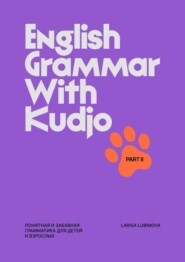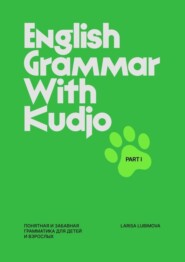По всем вопросам обращайтесь на: info@litportal.ru
(©) 2003-2025.
✖
English Grammar with Kudjo. Part 4. Понятная и забавная грамматика для детей и взрослых
Настройки чтения
Размер шрифта
Высота строк
Поля
Present/Future Possibility
We can use may, might and could to talk about things that are possible in the present and future.
The dogs believe Kit might come back very soon.
Some people say that might is less certain than may, but in spoken English there is really no effective difference. The word may is less common, and we can only use could in the positive form, not the negative form while talking about possibility. He might not find Kudjo.
Past Possibility
When talking about past possibilities, we can use
might have / may have / could have + V3 (for positive possibilities) and might not have / may not have + V3 (for negative possibilities).
Kudjo might not have seen any opportunity to keep in touch with his friends.
EXERCISE 2
Rewrite the sentences using the modal verbs of present or past possibility:
1 Perhaps evil ghosts captured Kudjo.
2 Maybe Kudjo hid somewhere from those ghosts.
3 Maybe Kudjo hasn’t found the way home yet.
4 Perhaps Kudjo has decided to solve the mystery on his own.
5 Perhaps Kudjo followed the blue light ball and it took him very far from home.
6 Perhaps Kudjo got into the abandoned camp and disappeared together with it.
7 Perhaps Kudjo will never be able to find the way home.
8 Maybe Kudjo is somewhere with other dogs having new adventures.
If we need to speculate about the action in progress at the moment of speaking, we use modal verb + be + Ving
Kudjo might be trying to get home now.
If we need to speculate about the action in progress in the past, we use modal verb + have been + Ving
The blue light must have been helping Kudjo all this time.
EXERCISE 3
Answer the questions using modal verbs of deduction:
For example,
What has Kit found in the pit? – He might have found a lot of bones.
1 What is Kit doing in the pit now?
2 Who made this pit and what for?
3 Where is the blue light and why isn’t it helping Kit?
4 What are the dogs arguing about?
5 Who have they decided to look for first? Kudjo or Kit?
6 Where did the abandoned camp disappear?
7 What has happened to Kudjo?
8 Why is Luna whining?
EXERCISE 4
Look at the picture and continue the sentences with your ideas:
For example,
Chilly and Cuba must be …. – Chilly and Cuba must be trying to trace Kit.
1 They are looking down because they must be…
2 They can’t have been ….
3 They look unhappy and frustrated so they might not have ….
4 Chilly is going first because he must ….
5 You can’t see Luna with them because she could be ….
6 The dogs are not talking to each other because they might not ….
7 They are going at a snail’s pace because they must be ….
8 Chilly arched his back because he might have ….
EXERCISE 5
Make a speculation about every situation using modal verbs of deduction:
For example,
Chilly has just found Luna’s backpack but it is empty. – The kitten can’t have escaped in it.








